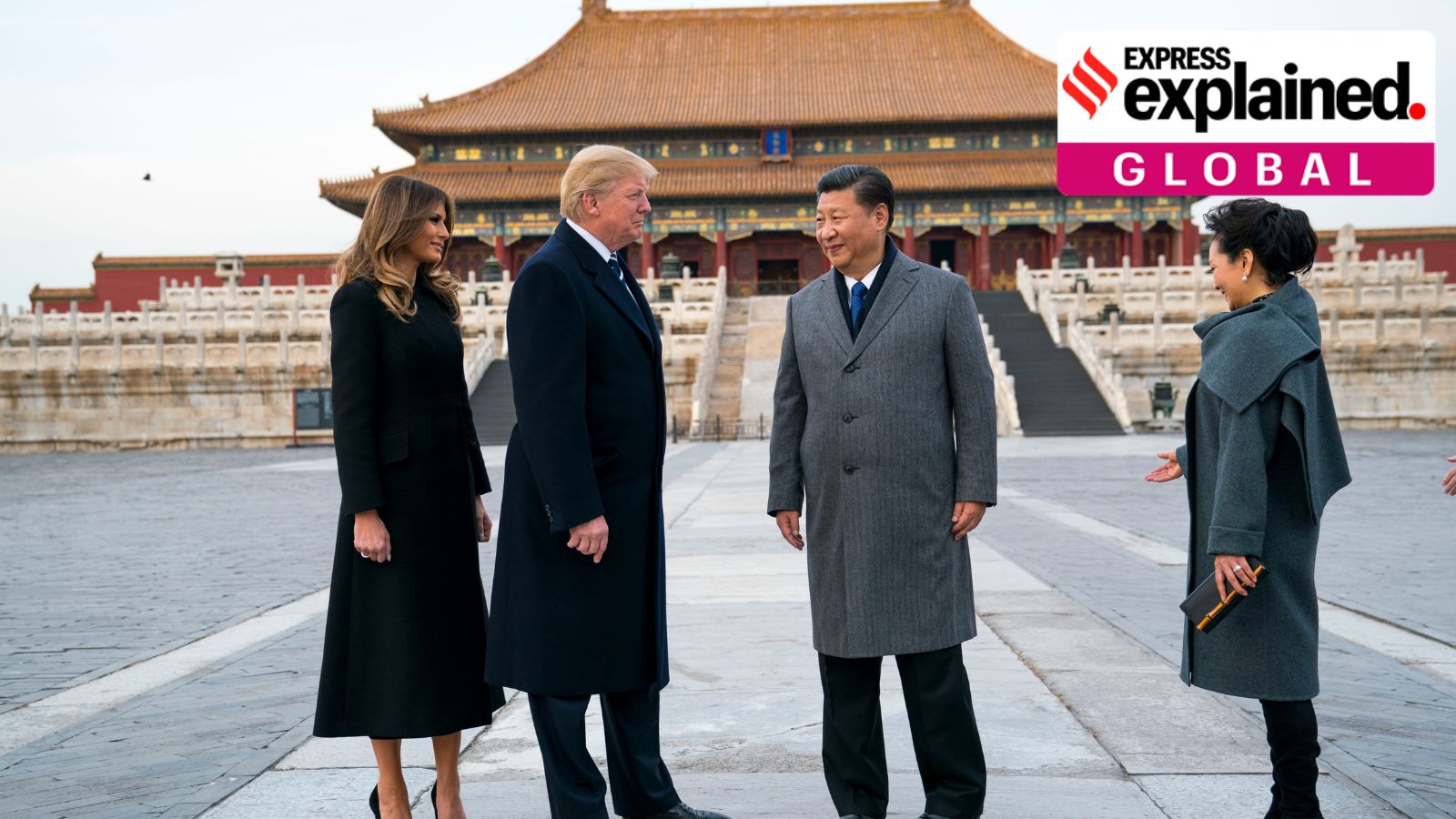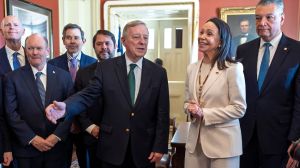Expert Explains: Harris or Trump, who China favours as US President, and why
Beijing's official position is that it does not have a preferred candidate for US President. However, both social media and mainstream media in China seem to believe Trump will be better for the Asian giant. Here's why.
 President Xi Jinping of China and his wife, Peng Liyuan, accompany President Donald Trump and first lady Melania Trump on a tour of the Forbidden City in Beijing on Nov. 8, 2017. (The New York Times)
President Xi Jinping of China and his wife, Peng Liyuan, accompany President Donald Trump and first lady Melania Trump on a tour of the Forbidden City in Beijing on Nov. 8, 2017. (The New York Times)It is perhaps true that every four years, the whole world keenly awaits the outcome of the US Presidential elections. But some countries have more at stake than others. As the White House gears up for a new Presidency again, among the nations watching closely is China, and speculations are rife about which of the two candidates, Kamala Harris or Donald Trump, Beijing favours.
In the US, David Rennie, geopolitics editor of the leading magazine The Economist, has predicted that China would want a Trump victory. In a news video clip released on November 2, Rennie based his prediction on three factors — trade, security, and predictability.
Interestingly, on the same day, China’s leading digital news daily Guancha.cn aired a live panel discussion with two of China’s leading experts on US-China relations: Professor Huang Jing of the Foreign Affairs University in Shanghai and Professor Jin Canrong of the People’s University in Beijing. The experts mostly agreed that a Trump 2.0 administration would be easier for Beijing to deal with.
Contrary to the official Chinese position that Beijing does not have a preference for either a Republican or a Democratic win, popular opinion on social media and op-ed columns in the mainstream media are favouring Trump (more than Republican Party) over Harris. Let’s understand why.
China ‘number one opponent’
In its October 17 issue, The Economist cited a top Chinese Communist Party official, Jia Qingguo, as saying China would prefer Harris to Trump as the next US president, considering bilateral ties deteriorated sharply during the latter’s presidency. Jia is on the Standing Committee of the national advisory body Chinese People’s Political Consultative Conference (CPPCC), a central part of the CCP’s united front system.
In both popular discourse and in academia in China, the broad consensus is that a Republican or Democrat victory is not going to fundamentally make US-China relations any better.
But Shao Shanbo, a Hong Kong-based scholar, in a recent column in mainland Chinese media has maintained that the above “common” view is both “biased” and “inconsistent.” “The similarities between the two sides are that both regard China as the number one opponent. However, there are some differences between the two candidates in this basic consensus, because they have different views on the United States’ own situation and its role in the international arena. And that is going to be important in their respective China policy,” Shao Shanbo opined.
From China’s security point of view, as also from Xi Jinping’s ambition to establish China as the number one power in the Asia-Pacific region, if Trump is elected, Beijing is more likely to benefit from the way the United States (mis)handles international relations. In a recent policy paper, Professor Michael Fox of the Royal Institute of International Affairs-Chatham House, London, said, “China views Trump’s election with a degree of schadenfreude, since they believe it casts a shadow over America’s relationship with allies like South Korea, Japan and the Philippines.”
In Shao Shanbo’s view, China well knows Trump’s “fickle and extreme personality”, but his America First and MAGA slogans mean [he] “wants America to shrink its global responsibilities. And that will be good for China’s strategic interests in Asia and in the Asia-Pacific.”
Several Chinese commenters have cited the Financial Times report last August which claimed the European Commission had already set up a dedicated team of officials to prepare for the potential return of Donald Trump to the White House.
US-China Business and Trade
In his 2016 campaign, Donald Trump claimed that China had developed by damaging the economic interests of the United States. He promised a trade war with China, which he delivered on. This time round, Trump is predictably consistent that China’s growth momentum is built on “theft of intellectual property rights” and “unfair trade practices” that damage American interests.
Harris’ stand, in keeping with the Joe Biden years, is that China’s rise will challenge American and Western values, and therefore, China must be prevented from further development in high technology, military prowess — especially its naval power — key economic links, etc.
Putin Factor
Fox in his paper warned of “a deal with Putin, targeting Iran…if Donald Trump wins in November and is as good as his word, America may add to global uncertainty and hand its rivals diplomatic victories.” For most strategic affairs experts in China, this is precisely the reason Beijing will be hoping for a Trump win.
Besides trying to “appease” the Russian leader Vladimir Putin during 2016-2020, Trump has repeatedly called for an end to “Biden’s war” in Ukraine. Moreover, coupled with his boasting of a personal relationship with Putin, Trump’s latest claim during the last leg of the campaign is to break the Beijing-Moscow “alliance.” In an interview with the former Fox News host Tucker Carlson, Trump accused Biden, saying “They [Biden administration] allowed Russia, China, Iran, North Korea and others to unite. I want to break them up (China and Russia).”
To this, Shan Shaobo reacted by saying, “With Trump’s election, it is still possible that US-Russia relations may change for the better, which is not bad from China’s point of view. But such a turnaround in Russia-US ties is impossible under the Harris administration.”
On Taiwan
If elected, Harris is likely to implement the Biden administration’s policy of attaching great importance to the strategic role of the “first island chain” in the Pacific and “using” Taiwan to provoke China.
On the contrary, most Chinese experts agree Trump has a different approach on Taiwan. He has said in the past that “Taiwan not only does not involve basic US interests but it [Taiwan] also does not have a role in geopolitics.”
Many in Taiwan, however, maintain that US policy towards the island has remained consistent under both Trump and Biden presidencies. In the opinion of Claus Soong, a Taiwanese analyst, “The Trump administration arguably set the tone for the high-level engagement with Taiwan that was taken up by the Biden Administration – for example, with the 2022 visit of the then US House of Representatives Speaker Nancy Pelosi. This continuity shows that countering China will remain a core policy focus, regardless of whether a Republican or Democrat is in power.”
To sum up, no external factor or a foreign policy issue is going to determine the outcome of the vote on November 5. But Donald Trump has told the American voters he won’t continue to spend, if re-elected, close to a quarter of the world’s GDP of the US tax-payers’ money to defend other people’s war – including in Ukraine, the Taiwan Strait, the South China Sea, in West Asia, etc. It is this that explains why China is keenly watching the election outcome. It is no coincidence that Xi has convened a crucial politburo meeting of the CCP on November 5-8.
- 01
- 02
- 03
- 04
- 05






































